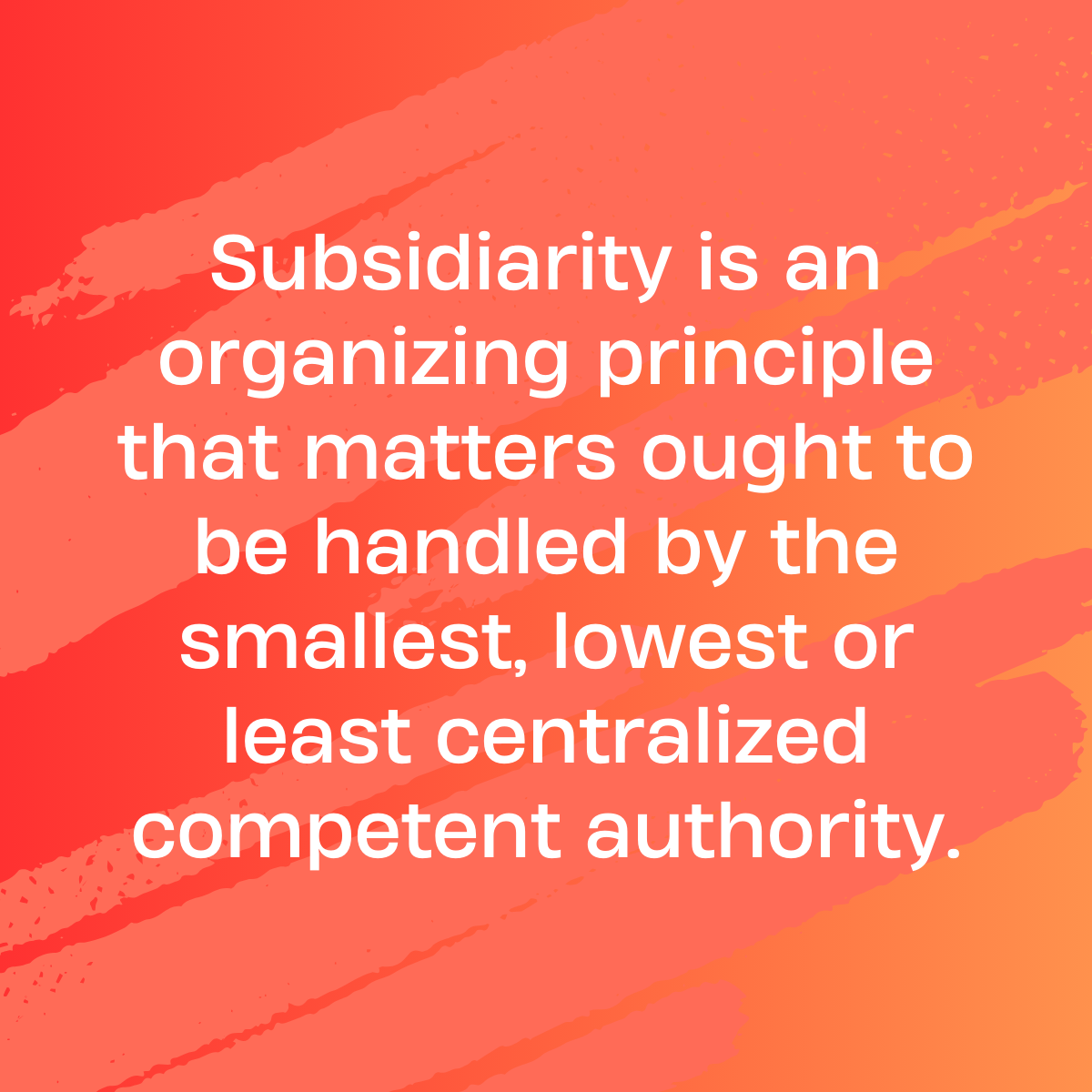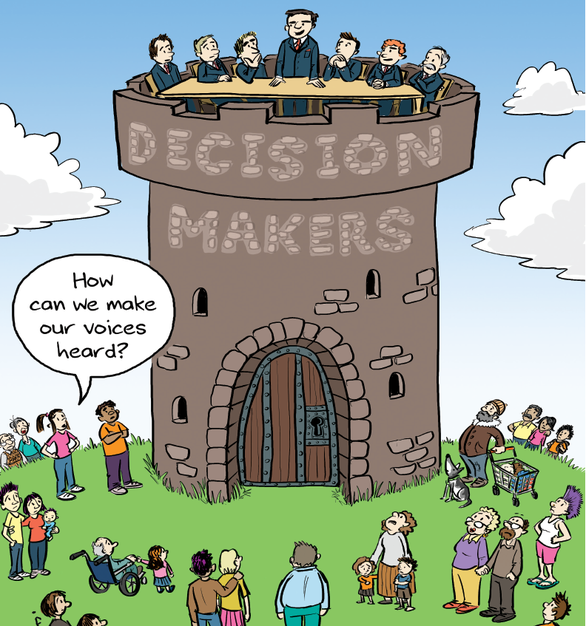Have you heard about the Habsburg Empire?
Have you heard about the Habsburg Empire? I bet you have. This family ruled Europe for more than 600 years and even once owned parts of the Americas.

Like many people, I studied the Habsburgs in history class. However, my closer encounter with the dynasty was through Eduard Habsburg, Archduke of Austria, who currently is ambassador of Hungary to the Holy See and the Sovereign Order of Malta.
To be clear, I was just following him on Twitter. Nevertheless, I enjoyed his posts, and when he released his book, “The Habsburg Way: Seven Rules for Turbulent Times,”I bought it immediately and read it (which I strongly recommend).
The Relevance of Subsidiarity Today
Although these seven "rules" cover many areas of life, the chapter about building the empire caught my attention due to its relevance to building large companies and organizations today. It's obvious that today's large corporations hold more power than many countries combined and are the real superpowers that control politics, society, and even geopolitics. Therefore, when building a multinational global corporation, there is much to learn from the lessons of building a large supranational empire, like the Habsburgs.
Introducing the Principle of Subsidiarity
One principle of building the empire described in Eduard Habsburg's book is the principle of subsidiarity, and that is the topic I would like to discuss further in this article. Although many people are familiar with this principle, it is often forgotten at certain levels. I will use this opportunity to introduce it more thoroughly, explain the benefits large corporations can gain from it, and provide a quick overview of strategies for implementation.
What is Subsidiarity?
Subsidiarity is an organizing principle that matters ought to be handled by the smallest, lowest, or least centralized competent authority.

Subsidiarity in the Habsburg Empire
In the Habsburg Empire, the principle of subsidiarity worked by giving various regions and ethnic groups significant autonomy to manage their own affairs, while the central authority handled larger issues like defense, foreign policy, and major economic strategies. This decentralized approach enabled diverse regions—each with distinct languages, cultures, and legal systems—to govern locally, addressing their specific needs and concerns more effectively. By empowering local governments and communities, the Habsburgs kept their diverse empire stable and united, balancing central control with regional self-governance.

Subsidiarity in Modern Corporations
Subsidiarity is a principle that suggests decisions should be made at the most local level possible. Some companies have been practicing this for a long time, while others could benefit from implementing these strategies. Subsidiarity is about empowering lower levels of an organization rather than centralizing power.
This concept, which was one of the success factors for the Habsburg Empire, can significantly improve the functioning of large corporations in several ways:
Benefits of Subsidiarity in Corporations
- Increased Efficiency and Responsiveness
- Decentralized Decision-Making: By empowering lower levels of the organization to make decisions, corporations can respond more quickly to local needs and market changes. This reduces the bureaucratic lag that often accompanies centralized decision-making.
- Tailored Solutions: Local managers and employees who are closer to the specific issues can develop more effective and customized solutions.
- Enhanced Innovation
- Encouraging Creativity: When decision-making power is distributed, employees at all levels feel more valued and motivated to contribute innovative ideas. This fosters a culture of creativity and experimentation.
- Diverse Perspectives: A decentralized approach allows a variety of perspectives and ideas to flourish, leading to more innovative solutions than a top-down approach.
- Improved Employee Engagement and Satisfaction
- Empowerment and Autonomy: Employees who have the authority to make decisions are more engaged and satisfied with their jobs. This leads to higher morale and retention rates.
- Sense of Ownership: When employees are involved in decision-making, they develop a stronger sense of ownership and commitment to the company's success.
- Better Risk Management
- Localized Risk Assessment: Managers and employees at different levels can better assess and manage risks pertinent to their specific areas. This localized knowledge can prevent potential issues from escalating.
- Flexibility: Subsidiarity allows different parts of the organization to adapt strategies to their particular risks, leading to more resilient overall operations.
- Enhanced Customer Relations
- Customer Proximity: Local decision-makers can build stronger relationships with customers, understanding and meeting their needs more effectively than distant corporate headquarters.
- Adaptability to Local Markets: Subsidiarity enables better adaptation to the nuances of different markets, enhancing customer satisfaction and loyalty.
- Strengthened Organizational Structure
- Flattening Hierarchies: By distributing decision-making power, organizations can flatten hierarchies, leading to more streamlined communication and a more agile organizational structure.
- Responsibility and Accountability: Clearer lines of responsibility and accountability at all levels can lead to more transparent and effective governance.
Implementation Strategies
- Empower Local Managers: Delegate decision-making authority to regional or local managers and provide them with the necessary resources and support.
- Establish Clear Guidelines: Develop clear guidelines and frameworks within which local units can operate, ensuring alignment with the overall corporate strategy.
- Invest in Training: Provide training and development programs to equip local managers and employees with the skills needed to make effective decisions.
- Foster Communication: Encourage open communication and knowledge sharing across different levels and regions of the organization.
- Monitor and Adjust: Continuously monitor the effectiveness of decentralized decision-making and be willing to make adjustments as needed.
Conclusion: Unlocking New Horizons
To build a leverage of power that works above and beyond the limits of the emperor and his ministers (or the CEO and executives nowadays), one should not aim to control everything. Sure, when it comes to power, there is always the temptation to obtain, concentrate, and wield as much power as possible, but this often backfires, sometimes against the ruler themselves. Instead, by implementing subsidiarity—a principle that helped the Habsburgs establish an empire that spanned countries and centuries—organizations can unlock new horizons and exceed their known limits.
Incorporating the principle of subsidiarity can lead to a more dynamic, responsive, and innovative organization, improving both internal operations and external customer relationships.
